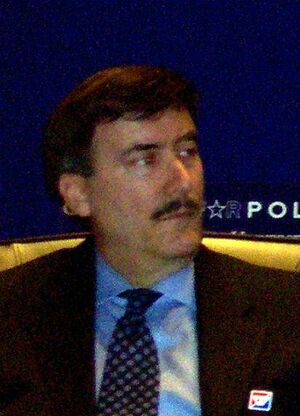Difference between revisions of "Larry J. Sabato"
(some tidy) |
m (Text replacement - "Early life and education" to "Background") |
||
| Line 15: | Line 15: | ||
He is Professor of Politics at the [[University of Virginia]], where he is also the founder and director of the [[University of Virginia Center for Politics|Center for Politics]], which works "to promote civic engagement and participation".<ref>http://www.centerforpolitics.org/staff_sabato.html</ref> The Center for Politics is also responsible for the publication of ''[[Sabato's Crystal Ball]]'', an online newsletter and website that provides "free" political analysis and electoral projections to corporate media. | He is Professor of Politics at the [[University of Virginia]], where he is also the founder and director of the [[University of Virginia Center for Politics|Center for Politics]], which works "to promote civic engagement and participation".<ref>http://www.centerforpolitics.org/staff_sabato.html</ref> The Center for Politics is also responsible for the publication of ''[[Sabato's Crystal Ball]]'', an online newsletter and website that provides "free" political analysis and electoral projections to corporate media. | ||
| − | == | + | ==Background== |
Sabato grew up in [[Norfolk, Virginia]], graduating from [[Norfolk Catholic High School (Virginia)|Norfolk Catholic High School]] in 1970.<ref>https://news.virginia.edu/content/man-season-larry-sabatos-passion-politics </ref> Four years later, he graduated from the [[University of Virginia]]. Sabato graduated [[Phi Beta Kappa]] with a degree in government. He followed his undergraduate degree with graduate study at [[Princeton University]]'s [[Woodrow Wilson School of Public and International Affairs]] for one year. He was awarded a [[Rhodes Scholarship]] in 1975, which brought him to study at [[The Queen's College, Oxford|Queen's College, Oxford]]. In less than two years he earned his doctorate in politics from Oxford.<ref>https://web.archive.org/web/20060618213954/http://www.centerforpolitics.org/about/staff_sabato.htm </ref> | Sabato grew up in [[Norfolk, Virginia]], graduating from [[Norfolk Catholic High School (Virginia)|Norfolk Catholic High School]] in 1970.<ref>https://news.virginia.edu/content/man-season-larry-sabatos-passion-politics </ref> Four years later, he graduated from the [[University of Virginia]]. Sabato graduated [[Phi Beta Kappa]] with a degree in government. He followed his undergraduate degree with graduate study at [[Princeton University]]'s [[Woodrow Wilson School of Public and International Affairs]] for one year. He was awarded a [[Rhodes Scholarship]] in 1975, which brought him to study at [[The Queen's College, Oxford|Queen's College, Oxford]]. In less than two years he earned his doctorate in politics from Oxford.<ref>https://web.archive.org/web/20060618213954/http://www.centerforpolitics.org/about/staff_sabato.htm </ref> | ||
Latest revision as of 13:24, 13 September 2024
(Academic) | |
|---|---|
 | |
| Born | Larry Joseph Sabato 1952-08-07 Norfolk, Virginia, U.S. |
| Alma mater | University of Virginia, Woodrow Wilson School of Public and International Affairs, Queen's College (Oxford) |
| Member of | Rhodes Scholar/1975 |
An American political scientist and political analyst used by corporate media as an election pundit. | |
Larry Joseph Sabato is an American political scientist and political analyst used by corporate media as an election pundit.[1]
He is Professor of Politics at the University of Virginia, where he is also the founder and director of the Center for Politics, which works "to promote civic engagement and participation".[2] The Center for Politics is also responsible for the publication of Sabato's Crystal Ball, an online newsletter and website that provides "free" political analysis and electoral projections to corporate media.
Background
Sabato grew up in Norfolk, Virginia, graduating from Norfolk Catholic High School in 1970.[3] Four years later, he graduated from the University of Virginia. Sabato graduated Phi Beta Kappa with a degree in government. He followed his undergraduate degree with graduate study at Princeton University's Woodrow Wilson School of Public and International Affairs for one year. He was awarded a Rhodes Scholarship in 1975, which brought him to study at Queen's College, Oxford. In less than two years he earned his doctorate in politics from Oxford.[4]
Prior to his time as a political analyst, Sabato worked for nine years with Virginia Democratic Party politician Henry Howell. At the age of 15, Sabato joined Howell's first campaign for the Virginia governorship in 1968, and then worked on his successful run for lieutenant governor in 1971, and his campaigns for governor in 1973 and 1977.[5]
Professorship
Before becoming an academician at the University of Virginia, Sabato published works on the rise of two-party politics in the southern United States, most notably his 1977 publication of The Democratic Party Primary in Virginia: Tantamount to Election No Longer.[6] In 1978, Sabato became a member of the faculty at the University of Virginia. Since then he has engaged in research and taught more than 14,000 students.[7]
He is a University Professor and the Robert Kent Gooch Professor of Politics at the University of Virginia.
In 2005, Sabato made a $1 million contribution to UVA, the largest gift ever given by a faculty member.
His 2013 book The Kennedy Half-Century: The Presidency, Assassination, and Lasting Legacy of John F. Kennedy "blew out the water" the 1979 United States House Select Committee on Assassinations (HSCA) conclusion of a possible second shooter, stating that it was [8]
A Quote by Larry J. Sabato
| Page | Quote | Date | Source |
|---|---|---|---|
| "Iran-Contra" | “One of the most complicated and intrigue-filled scandals in recent decades, the Iran-contra affair dominated the news for many months. It consisted of three interconnected parts: The Reagan administration sold arms to Iran, a country desperate for materiel during its lengthy war with Iraq; in exchange for the arms, Iran was to use its influence to help gain the release of Americans held hostage in Lebanon; and the arms were purchased at high prices, with the excess profits diverted to fund the Reagan-favored "contras" fighting the Sandinista government in Nicaragua.” | 1998 | The Washington Post |
References
- ↑ https://www.washingtonpost.com/blogs/erik-wemple/wp/2016/04/20/dont-offer-to-clean-up-cable-tv-pundit-larry-sabatos-famous-office/
- ↑ http://www.centerforpolitics.org/staff_sabato.html
- ↑ https://news.virginia.edu/content/man-season-larry-sabatos-passion-politics
- ↑ https://web.archive.org/web/20060618213954/http://www.centerforpolitics.org/about/staff_sabato.htm
- ↑ http://www.readthehook.com/stories/2006/11/02/COVER-Sabato-E.doc.aspx
- ↑ Charlottesville: University Press of Virginia, 1977, ISBN 0-8139-0726-8 and ISBN 978-0-8139-0726-0.
- ↑ http://www.ajr.org/article.asp?id=3857
- ↑ https://www.cbsnews.com/news/jfk-assassination-conspiracy-theory-blown-out-of-the-water-in-new-book-author-says/